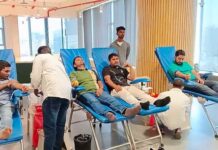~Doctors from Apollo Group participate in the initiative to leverage telemedicine to the fullest to benefit patients
~Telehealth services emerge as a viable alternative to face-to-face medical consultations when social distancing is in force
National, April 15, 2020: The Apollo Hospitals Group today announced its support of the initiative by the Medical Council of India (MCI) and Telemedicine Society of India (TSI) to sensitize and train doctors around the country in deploying telehealth services on a wide scale to meet the healthcare needs of the people during the COVID-19 crisis. Doctors across the country are being asked to join this initiative by attending the training module and upskilling themselves in offering telehealth services to as many people as possible. This will solve the problem of accessibility to quality clinical care and ensure continuum of care across the length and breadth of the country. Over 2500 doctors across the Apollo Hospitals Group will be participating in the online Telehealth orientation programme, giving a boost to the group’s efforts in empowering healthcare practitioners to effectively deliver Remote Health Care.
The Apollo Hospitals Group has been one of the global pioneers of telemedicine and its division, Apollo Telehealth has enabled accessibility to quality healthcare through remote healthcare services for over two decades. Dr. Prathap C. Reddy, Chairman, Apollo Hospitals Group said, “As early as 1998, we decided to introduce Telemedicine and on March 24, 2000, the world’s first VSAT enabled village hospital at my birthplace Aragonda in Andhra Pradesh was commissioned by the then US President, Bill Clinton. Over the last two decades the Apollo Telehealth division has grown exponentially, offering over 10,000 tele-consults a day and running the world’s largest Tele Emergency service as well as many PPP projects. In continuation of our efforts to provide uninterrupted quality care to all sections of the society we are now pleased to support the MCI’s initiative in training doctors to effectively leverage telehealth facilities.”
The COVID-19 crisis and the resultant lockdown with restrictions on travel has resulted in an increased demand for telemedicine services and in response to this, the Ministry of Health & Family Welfare formally notified an amendment to the MCI Act by instituting the Telemedicine Practice Guidelines. Following this, Chairman Board of Governors (of superseded MCI) requested TSI to train 500,000 doctors within a month in effectively leveraging telehealth facilities. The orientation program has been specifically developed to achieve this purpose and Apollo TeleHealth is actively supporting this endeavour.
Dr Sangita Reddy, Joint Managing Director, Apollo Hospitals Group said, “We were early adopters and most of our doctors use Telemedicine with excellent clinical outcomes. We are pleased that the Ministry of Health and Family Welfare has notified the amendment detailing Telemedicine practice guidelines. With the entire country in a lockdown to enforce social distancing to prevent the spread of COVID-19, many patients are unable to visit doctors and hospitals for their consultations and follow-ups. This may affect the continuity of treatment especially in cases of non-communicable diseases (NCDs) like diabetes, high blood pressure, and heart disease and telemedicine permitting virtual consultations will be of immense benefit in these cases. I complement TSI for the remarkable pro-active steps taken to ensure that all doctors in India are not just trained in COVID-19 management, but equally important trained in deploying telehealth for COVID-19 and non COVID situations.”
The 2-3 hour training module prepared by TSI consists of three modules – Telemedicine Practice Guidelines, Telemedicine Basics and Tele-Triage. Each module consists of 20 minutes of lecturing plus 40 minutes of video and Questions & Answers. The Live Webinar can simultaneously engage several hundreds of participants in a remote classroom setting.
“With many hospitals having to close non-emergency OPDs due to the COVID-19 crisis, it is important that we equip our healthcare practitioners in using alternative technology-backed methods to serve patients. With this initiative, specialists from all our 55+ will be available round the clock to deliver seamless clinical care. We have also realized that doctors also need to be sensitized in dealing with suspected COVID-19 patients as well as confirmed cases currently on home quarantine. We hope this initiative will help prepare India’s large healthcare workforce in effectively dealing with this crisis,” said Prof. Anupam Sibal, Group Medical Director at Apollo Hospitals
He further commented that “The doctors at Apollo Hospitals have always been at the forefront of technology adoption for better clinical results and for the benefit of the patient. I believe this is one more step in our patient centric approach while ensuring best clinical outcomes.”
Prof K Ganapathy Director Apollo Telemedicine Networking Foundation and Past President Telemedicine Society of India said “It is only fitting that the oldest and largest Telemedicine network in the region shows the way. We are ensuring that all our doctors to enrol in the online training program put together by the Telemedicine Society of India. I hope that all hospitals, big and small, will follow in the footsteps of Apollo Hospitals and ensure that their doctors get sensitized to the use of telehealth”
With the demand for telemedicine surging in the wake of the coronavirus outbreak, Apollo TeleHealth has already witnessed an almost 100% spike in teleconsultations. Apollo TeleHealth has also trained its primary healthcare workforce pan India including doctors, nurses, midwives, lab technicians in dealing with the COVID-19 pandemic. Apollo TeleHealth provides healthcare services through PPPs with several state governments. It runs a strong and robust network of telehealth enabled primary health centers in Andhra Pradesh, Uttar Pradesh and Jharkhand and tele emergency centers in Himachal Pradesh.
Corporate Comm India (CCI Newswire)
























